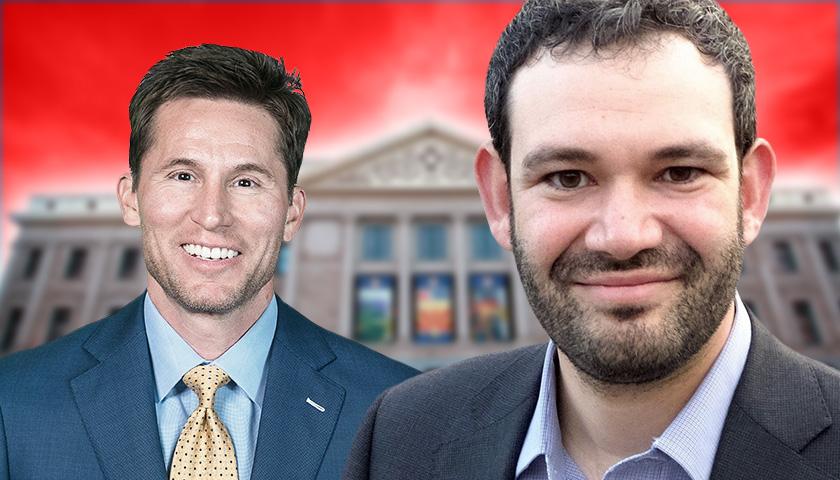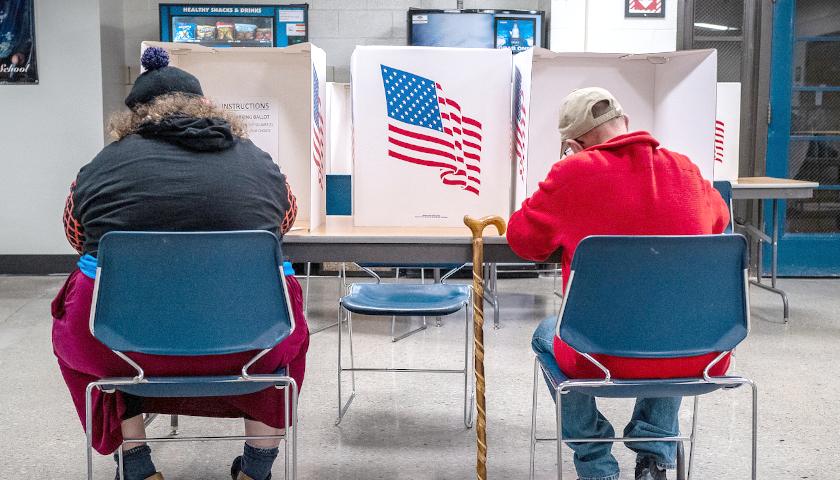AmericaPack and EZAZ, two of the main conservative grassroots organizations in Arizona, are pairing up to “flip Arizona solid red.” EZAZ’s Merissa Hamilton spoke to a large group of AmericaPack supporters Friday evening about the “Arizona Rescue Mission” the groups have crafted to get more voters voting Republican and running for office. State Representative Alex Kolodin (R-Scottsdale) and State Representative Joseph Chaplik (R-Scottsdale) provided updates on the Arizona Legislature, and a Phoenix Police Department (PPD) sergeant talked about the lack of patrol officers within the PPD.
Hamilton told the attendees about the new grassroots project, “[This is] so that we have the infrastructure built so that when the election cycle comes around next time, not only will this room be filled, but it will be filled with new faces with people that have not been as involved … and it will be because of us.”
Hamilton said the project is modeled after a successful effort in Florida to turn Miami red. She said there are some things the grassroots does better than the Republican Party, such as building infrastructure.
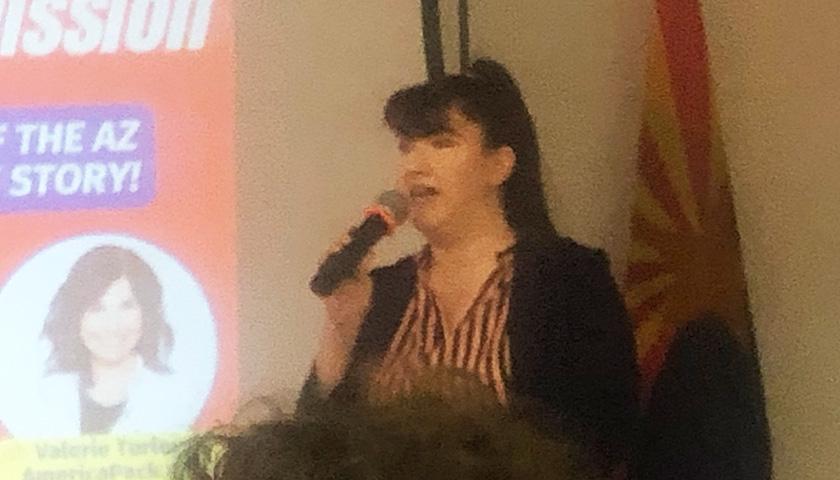 She said the left has been creating its own grassroots infrastructure in Arizona in recent years, beginning in 2009, which can be seen at One Arizona. Hamilton said there are 29 organizations listed on the site that are working together to turn Arizona blue, and the number is actually closer to 90 organizations. They are funded with at least $500,000 each, she said. Hamilton said working through grassroots groups like them, instead of through the Democratic Party, is how the left turned Colorado blue. She recommended the book The Blueprint: How the Democrats Won Colorado (and Why Republicans Everywhere Should Care).
She said the left has been creating its own grassroots infrastructure in Arizona in recent years, beginning in 2009, which can be seen at One Arizona. Hamilton said there are 29 organizations listed on the site that are working together to turn Arizona blue, and the number is actually closer to 90 organizations. They are funded with at least $500,000 each, she said. Hamilton said working through grassroots groups like them, instead of through the Democratic Party, is how the left turned Colorado blue. She recommended the book The Blueprint: How the Democrats Won Colorado (and Why Republicans Everywhere Should Care).
Hamilton said the Democrats are targeting swing districts. She added that one of the methods they use in those races is to take the money given to Citizens Clean Elections Commission (CCEC) candidates in solidly Democratic areas and give it to Democrats in swing districts. CCEC describes itself as a “non-partisan commission created by voters that educates voters, and provides campaign funding and enforces campaign finance rules and laws.”
Due to their aggressive voter registration efforts, Hamilton said the Democrats registered more voters than Republicans have some years. She noted that they register some Republicans as well and suspects — although she does not have proof — that they are ballot harvesting for those voters. Hamilton said 53 swing precincts in Maricopa County went from red to blue in 2022.
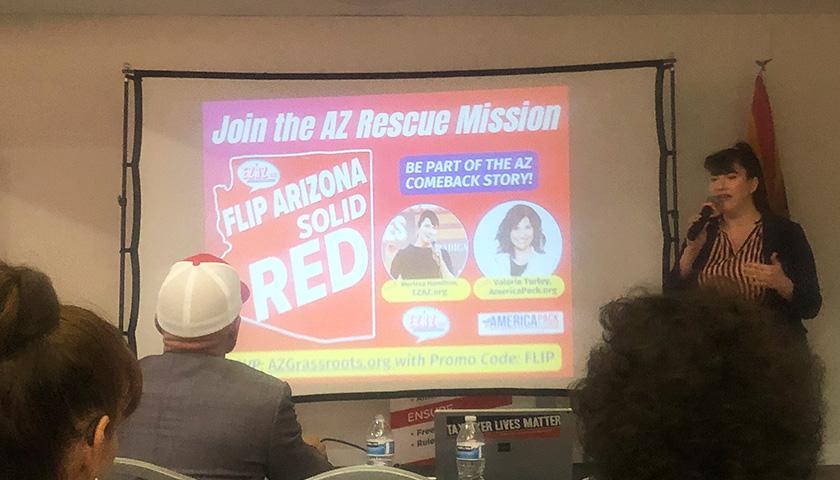 The project consists of several phases. The first phase is voter contact, consisting of knocking on doors and inviting interested voters to meet and greet events. EZAZ surveyed voters and found that inflation was the most important issue to them, followed by homelessness and border security tied for second most important, and education the third most important.
The project consists of several phases. The first phase is voter contact, consisting of knocking on doors and inviting interested voters to meet and greet events. EZAZ surveyed voters and found that inflation was the most important issue to them, followed by homelessness and border security tied for second most important, and education the third most important.
She cited a recent poll that found that 50 percent of voters approved of the performance of Democratic Governor Katie Hobbs. When EZAZ asked voters themselves, they found that the poll was accurate. However, once EZAZ told voters about Hobbs’ vetoes, the voters changed their minds to “strongly oppose” her.
Hamilton said when she ran unsuccessfully for mayor of Phoenix in 2020, she walked door-to-door in the Democratic stronghold of south Phoenix and found that voters there did not realize they did not support the policies of Democrats. For example, they were unaware that Democrats wanted to defund law enforcement. They wanted more law enforcement in their neighborhoods, not less.
The next phase of the project, Hamilton said, is building a grassroots infrastructure. This will involve training and education and getting voters involved with EZAZ and AmericaPack.
She said Hobbs ran as a “moderate Republican” but is vetoing bills on issues she claimed to support. Hamilton pointed out how Hobbs takes photos at the border with Mexico but defunded the National Guard in Cochise County, which is located on the border.
Hamilton said the project will focus on swing districts and precincts, holding meet-and-greet events in those areas. She urged attendees to join their teams focusing on school boards since she said even Democrats don’t want radical Marxism in schools.
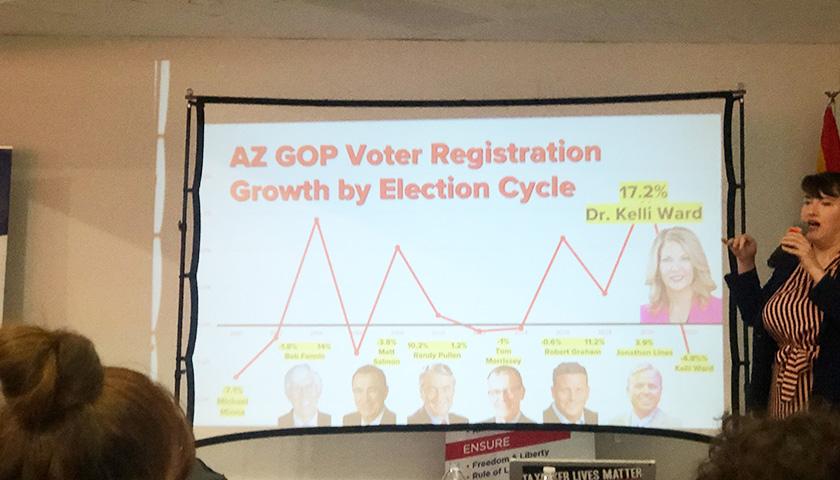 She also urged attendees to join the city council teams, warning that the City of Phoenix is considering a 42 percent tax on water. She said that the Maricopa Association of Governments is trying to implement rapid transit lanes dedicated solely to buses.
She also urged attendees to join the city council teams, warning that the City of Phoenix is considering a 42 percent tax on water. She said that the Maricopa Association of Governments is trying to implement rapid transit lanes dedicated solely to buses.
Hamilton said they created a website to rate lawmakers on how they vote on 68 bills proposed this year related to inflation and economic opportunity, AZ Inflation Relief. The Democrats voted against almost all of them, she said.
Kolodin, a newly elected legislator and election attorney, reminded attendees that he kicked off his campaign at AmericaPack. He said he thought he “went down to the Capitol to be an election denier,” but said he focused a lot on the Rio Verde water shortage issue. Kolodin said he co-sponsored a bill with Chaplik, HB 2561. After two hours of hashing it out with the Scottsdale city manager and Maricopa County lobbyists, they solved the dilemma.
However, he said the Democrats want a “policy concession” to support the bill, which involves setting up “bureaucratic” steps to make it more difficult for homeowners to build a single additional house on their property.
Another bill Kolodin is sponsoring, along with freshman State Senator Justine Wadsack (R-Tucson) and others, would “prohibit political prosecutions.” He proposed HB 2321 in response to Democratic Secretary of State Adrian Fontes suggesting to Democratic Arizona Attorney General Kris Mayes that she prosecute Kari Lake, former Arizona Republican Party Chair Kelli Ward, and We the People AZ’s Shelby Busch. The bill has gotten through the Senate, and now awaits House action.
He said the main opposition didn’t come from Democrats but from legislative staff and urged attendees to contact State Representative Matt Gress (R-Phoenix) to insist that he support it.
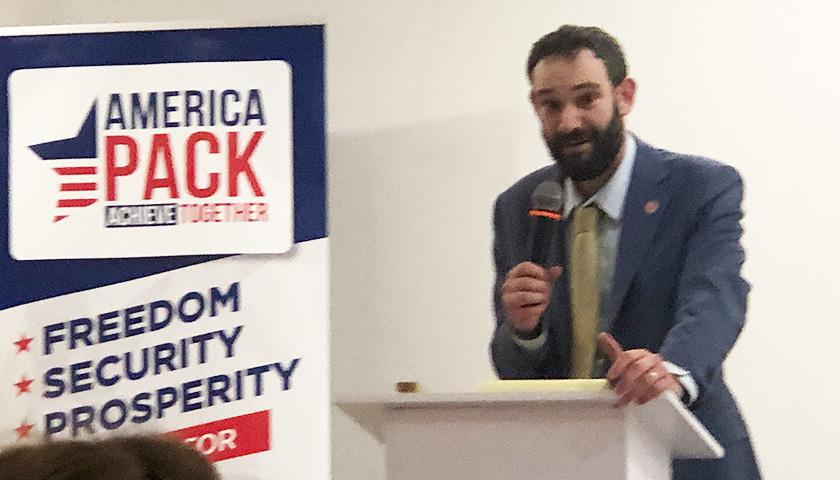 Kolodin is sponsoring a bill to toughen up signature verification requirements with ballots, HB 2322, which passed the House with 15 Democrats voting in favor of it. He believes there is a good chance Hobbs will sign it since “20 pages” of it are her own previous writing.
Kolodin is sponsoring a bill to toughen up signature verification requirements with ballots, HB 2322, which passed the House with 15 Democrats voting in favor of it. He believes there is a good chance Hobbs will sign it since “20 pages” of it are her own previous writing.
Kolodin said he and others in the legislature are focusing on two priorities: “[K]illing bad bills Hobbs might sign,” and “using legislative powers that aren’t bills,” like litigation and investigation.
He provided an update on the state’s controversial Election Procedures Manual (EPM), which was never updated past the 2019 version as required by law since Hobbs refused to make the changes former Attorney General Mark Brnovich instructed her to. Kolodin said Fontes intends to revert to an even earlier version of the EPM, the 2014 version. Kolodin said, “We’re gonna watch him like a hawk because I’m sure he’s got other janky stuff up his sleeve.”
Chaplik, a favorite of AmericaPack and other grassroots organizations, explained how even though he lost the election for Speaker of the House by two votes, he now has those two votes in his corner and maybe even another three. He explained how as vice-chair of the House Appropriations Committee, he is required to attend governor’s meetings “when she’s decided to work; I guess she hasn’t been working yet for a few months.”
He expressed his concern that the legislature is not getting the word out to the public about what is taking place, pointing out that although he wanted six communications staffers, only one was hired, Ari Bradshaw of Young Republicans. He encouraged attendees to follow Bradshaw on social media for updates.
Bradshaw retweeted a viral video of Democrats mocking the savings to Arizonans from a bill that would repeal the food tax. “Some Democrats even said it’s ‘just a couple of hundred dollars,’” the original tweet from the North Valley Young Republicans said. Even without the help getting news from the legislature out, videos of the House Freedom Caucus’s press conferences are going national, Chaplik said.
Chaplik added that Republicans are considering a rule change that would limit the number of proposed lobbyist-driven bills. The state representative said this session House Republicans proposed 600 bills and House Democrats proposed 400 bills. “Half we shouldn’t see,” he said, pointing out that “some legislators drop 50 bills due to lobbyists.”
He told how one legislator sponsored a 125-page bill to “wipe out cryptocurrency” while sitting on a state board dealing with cryptocurrency. The Arizona Freedom Caucus, which Chaplik is part of, found out the connection and exposed it, he said.
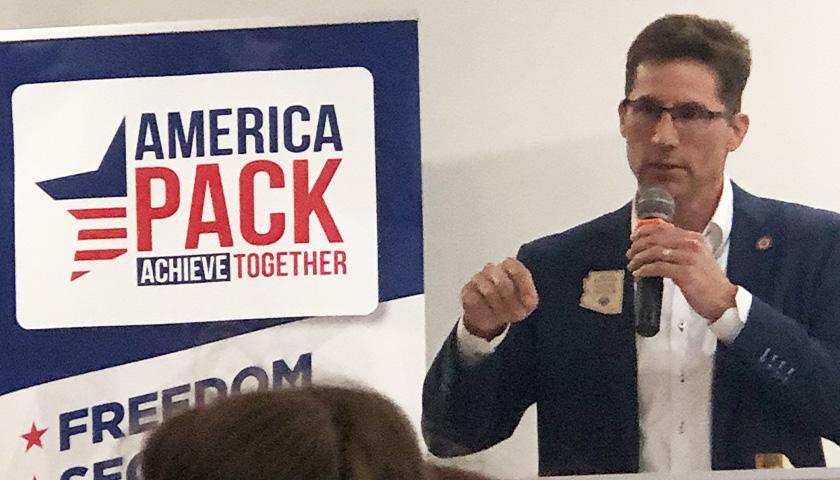 Chaplik sponsored HCR 2039, which limits the governor’s powers to keep a state of emergency going. As a House Current Resolution, it will go to the ballot for voters to decide, not to the governor.
Chaplik sponsored HCR 2039, which limits the governor’s powers to keep a state of emergency going. As a House Current Resolution, it will go to the ballot for voters to decide, not to the governor.
He sponsored HB 2555, which prohibits businesses from refusing to take cash. He said, “We need that, you know why? Because the moment it’s gone, it’s digital. And as soon as they can track every dime you spend, they’re gonna audit you or they’re gonna see everything you’re doing around this; where you’re traveling, where you’re going, what you’re buying, what you’re spending your money on, and that’s our privacy.”
Other legislation he said is important would ban photo radar. He said law enforcement is violating the law by not looking at every ticket that is issued. Another issue is that 10 percent of the revenue from photo radar tickets goes to CCEC. “Nine out of 10 who run clean are Democrats,” he said, and the ones in safe Democratic districts give their CCEC money to Democrats running in swing districts. State Sen. Wendy Rogers (R-Flagstaff) is sponsoring that legislation, SB 1234.
Chaplik discussed the budget negotiations with the governor, stating that Republicans will continue sending her budgets until she signs one, and he predicted that Hobbs will sign a budget.
“We are going to win,” the state representative said.
He added that spending has become excessive since there has been a “48 percent increase” over the last 10 years in funds for education. He said even though school enrollment is barely up 4 percent statewide, and in the Scottsdale Unified School District, enrollment is down, teachers are still making low salaries.
The PPD sergeant relayed how even though Phoenix is comparable in population to Philadelphia — and covers more territory — Philadelphia has 4,000 police officers while Phoenix has only 2,570. The sergeant broke the numbers down, explaining how around 300 PPD officers are patrolling at any one time. He estimates PPD needs about 1,500 more officers to be fully protected.
So far, there have been 11 shootings involving PPD this year, he said. He said although the violence has increased, “We’re still a safe city; we’re not the most violent.”
– – –
Rachel Alexander is a reporter at The Arizona Sun Times and The Star News Network. Follow Rachel on Twitter. Email tips to [email protected].
Photo “Alex Kolodin” by Alex Kolodin for State Rep. – LD 3. Photo “Joseph Chaplik” by Joseph Chaplik. Background Photo “Arizona Capitol” by Gage Skidmore. CC BY-SA 2.0.

